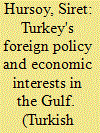| Srl | Item |
| 1 |
ID:
117570


|
|
|
|
|
| Publication |
2011.
|
| Summary/Abstract |
Since the changes introduced in Turkey's foreign policy during the 2000s, it has reached a stage that calls for an urgent review of its regional and global strategic choices. This article analyzes Turkish Foreign Minister Ahmet Davutoglu's foreign policy doctrine, examines its limitations and critically evaluates its relevance to current foreign policy-making. Recent events in the Middle East pose a challenge to the soft power, 'zero conflict' policy introduced by Davutoglu. Consequently, Turkey's foreign policy rhetoric over the past two years has hardened, triggered by uncertainties in Turkey-European Union (EU) relations, the deterioration in its relationship with Israel, and the Arab Spring events that have engulfed countries in its periphery. Since the EU plays an important role in terms of the democratic and economic transformation of Turkey, the country's accession to the EU would be important in ensuring both the continuance of its soft power strategy and its security strategy in line with Davutoglu's 'strategic depth' doctrine.
|
|
|
|
|
|
|
|
|
|
|
|
|
|
|
|
| 2 |
ID:
112419


|
|
|
|
|
| Publication |
2012.
|
| Summary/Abstract |
The central argument of this article is that the strong state-centred tradition of Turkey has recently gone out of fashion. The breakdown of authoritarianism and state-centred approach and moving into a successful democratic consolidation and society-centred approach in Turkey requires choices to be made and alliances to be formed among intellectual-bureaucratic elite, the military, political parties, trade unions, other interest groups and various types of societal organisations. One of the most important difficulties for consolidating democracy in Turkey has been the complexity of creating stable, viable, accountable, responsive, predictable, representative, transparent, efficient and problem-solving oriented legitimate institutions where all citizens, regardless of ethnic origin or religious orientation, have a voice and enabling representation in such bureaucratic organs that altogether make-up the institution of state. This article will assert that the forces of democratic transition from a state-centred approach to a society-centred approach in Turkey are based on resolving the two main potentially difficult problems that are related with constant questioning of the legitimacy and democratic consolidation of the state apparatus: ethnic and religious paradoxes.
|
|
|
|
|
|
|
|
|
|
|
|
|
|
|
|
| 3 |
ID:
067800


|
|
|
| 4 |
ID:
123429


|
|
|
|
|
| Publication |
2013.
|
| Summary/Abstract |
Although there are some explicit political and security dimensions to Turkish foreign policy in the Gulf region, the overall rationale is economic. This paper examines the active Turkish foreign policy, the complex dynamics in the Gulf where Turkey could offer possible alternative solutions for regional and international problems, and the extent to which the bilateral economic objectives which are being pursued in the Gulf will inevitably generate a more substantial political and strategic role for Turkey. The following political and economic issues with some convergences and divergences between Turkey and the Gulf Co-operation Council (GCC) countries will be discussed: how the moderating role of Turkey began to gain substance as a unique example of modernization in the aftermath of the nascent political Arab Spring events in the Gulf and how the substantial increase of business and trade levels resulted in the improvement of relations between Turkey and the GCC countries. The fundamental premise in this paper will be that Turkey-GCC ties have to go beyond preferential trading partnerships and address a number of primary political challenges.
|
|
|
|
|
|
|
|
|
|
|
|
|
|
|
|